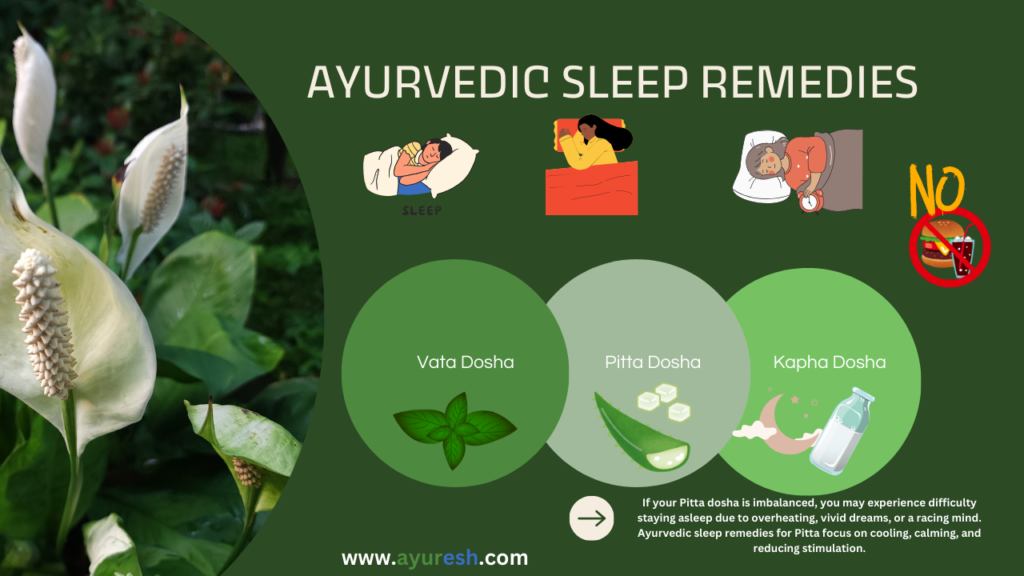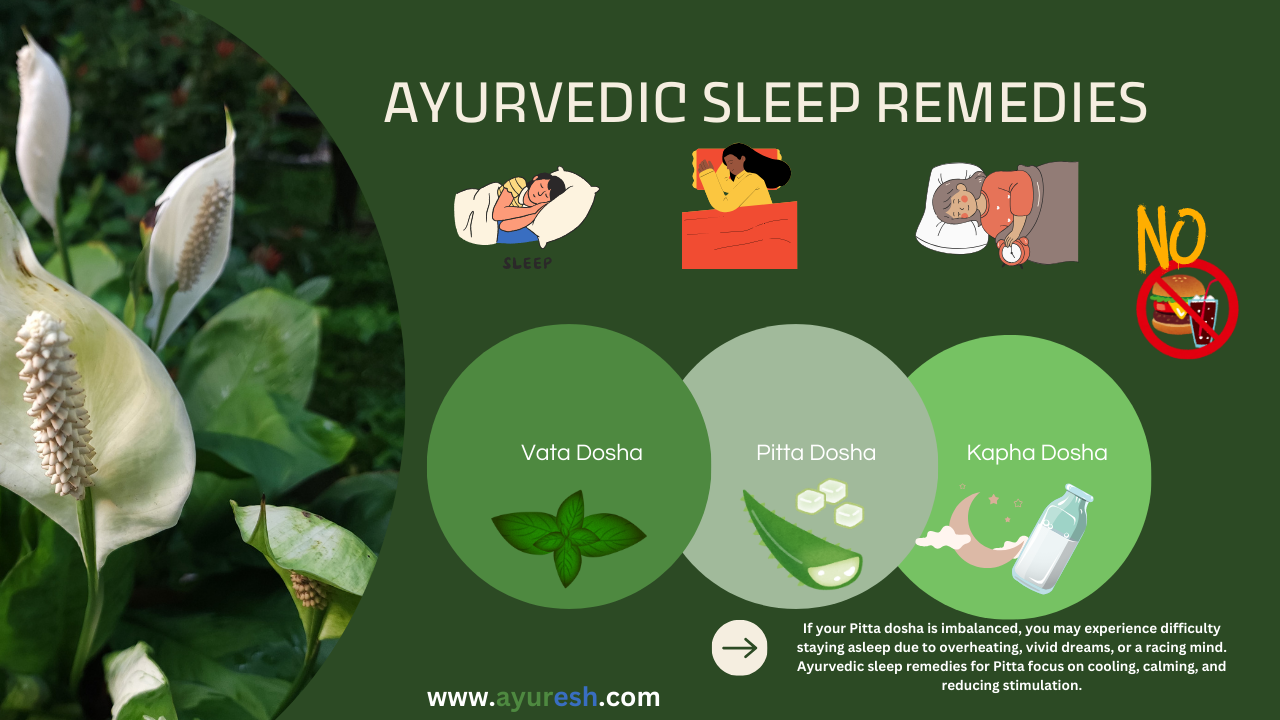
Sleep is a fundamental aspect of our health, yet in today’s fast-paced world, quality sleep often eludes us. Ayurveda, the ancient Indian system of medicine, offers a holistic approach to improving sleep through natural, time-tested remedies. Unlike modern sleep aids that often come with side effects, Ayurvedic sleep remedies focus on balancing the body, mind, and spirit to promote deep, restorative sleep.
Ayurvedic Sleep Remedies
In this blog, we will explore Ayurvedic sleep remedies that can help you achieve better sleep quality. These remedies are tailored to align with your unique dosha constitution, addressing the root causes of sleep disturbances rather than just the symptoms. Whether you struggle with falling asleep, staying asleep, or waking up refreshed, these Ayurvedic sleep remedies offer natural and effective solutions.
Table of Contents
Understanding Sleep in Ayurveda

In Ayurveda, sleep (Nidra) is considered one of the three pillars of health, along with proper diet (Ahara) and balanced living (Brahmacharya). According to Ayurvedic principles, sleep is essential for maintaining a healthy mind, body, and spirit. It rejuvenates the body, supports cognitive function, and balances the emotions. Poor sleep can lead to an imbalance in the doshas—Vata, Pitta, and Kapha—resulting in various health issues.
The Role of Doshas in Sleep
- Vata Dosha: Vata governs movement and activity in the body and mind. When Vata is imbalanced, it can cause restlessness, anxiety, and insomnia, making it difficult to fall asleep or stay asleep.
- Pitta Dosha: Pitta is associated with heat, metabolism, and transformation. An imbalanced Pitta dosha can lead to irritability, anger, and night sweats, disrupting sleep and causing vivid dreams or nightmares.
- Kapha Dosha: Kapha is responsible for stability, structure, and grounding. While Kapha is generally associated with deep, restful sleep, an excess of Kapha can lead to oversleeping, sluggishness, and difficulty waking up in the morning.
Ayurvedic Sleep Remedies for Vata Imbalance
If you have a predominant Vata dosha or are experiencing a Vata imbalance, you may find it challenging to quiet your mind at night. Ayurvedic sleep remedies for Vata focus on grounding, calming, and soothing the nervous system.
- Warm Oil Massage (Abhyanga): A warm oil massage before bed helps calm the nervous system and prepare the body for sleep. Use warm sesame oil or almond oil, massaging it gently into your skin to promote relaxation.
- Herbal Tea: Drinking a warm cup of herbal tea made from calming herbs like ashwagandha, chamomile, or tulsi can help settle your mind and prepare your body for rest.
- Routine and Regularity: Establishing a consistent sleep schedule is crucial for balancing Vata. Go to bed and wake up at the same time every day, even on weekends, to regulate your body’s natural rhythms.
- Warm Bath: Taking a warm bath with a few drops of lavender or sandalwood essential oil before bed can help soothe your senses and relax your muscles, making it easier to fall asleep.
- Grounding Foods: Incorporate grounding foods like sweet potatoes, warm milk, and cooked grains into your evening meal. These foods help calm Vata and promote a sense of stability and comfort.
Ayurvedic Sleep Remedies for Pitta Imbalance
If your Pitta dosha is imbalanced, you may experience difficulty staying asleep due to overheating, vivid dreams, or a racing mind. Ayurvedic sleep remedies for Pitta focus on cooling, calming, and reducing stimulation.
- Cooling Herbs: Incorporate cooling herbs like Brahmi, Shatavari, and Gotu Kola into your diet or as supplements. These herbs help reduce excess heat in the body and promote restful sleep.
- Aloe Vera Juice: Drinking a small amount of aloe vera juice before bed can help cool your system and reduce Pitta-related sleep disturbances.
- Moon Milk: Moon milk, made from warm milk, turmeric, and ashwagandha, is a traditional Ayurvedic remedy that helps calm the mind and body. Add a pinch of nutmeg and a few drops of rose water to enhance its cooling effects.
- Meditation and Pranayama: Practice calming meditation and deep breathing exercises (Pranayama) before bed. These practices help cool the mind and reduce Pitta-driven stress and irritability.
- Avoid Spicy Foods: In the evening, avoid spicy, acidic, and oily foods, as they can aggravate Pitta and disrupt sleep. Opt for cooling, mild foods like cucumbers, leafy greens, and coconut water.
Ayurvedic Sleep Remedies for Kapha Imbalance
Kapha imbalances can lead to excessive sleep, sluggishness, and difficulty waking up in the morning. Ayurvedic sleep remedies for Kapha focus on stimulation, invigoration, and maintaining energy levels throughout the day.
- Invigorating Herbs: Use stimulating herbs like ginger, black pepper, and cinnamon in your evening meals to help balance Kapha and prevent oversleeping.
- Light Dinner: Eat a light, easily digestible dinner to avoid Kapha-related sluggishness in the morning. Soups, salads, and steamed vegetables are ideal choices.
- Morning Exercise: Engage in regular physical activity, especially in the morning, to balance Kapha and maintain energy levels throughout the day. Yoga, brisk walking, or jogging can help invigorate the body and mind.
- Early Wake-Up: Try to wake up before sunrise, between 5:30 and 6:00 AM, to align with the natural rhythms of the body and prevent Kapha-related lethargy.
- Aromatherapy: Use invigorating essential oils like eucalyptus, rosemary, or peppermint in a diffuser or apply them to your temples and wrists to help stimulate the senses and balance Kapha.
Read More about – How to Balance Your Doshas
General Ayurvedic Sleep Remedies for All Doshas
In addition to the specific remedies for each dosha, there are general Ayurvedic sleep remedies that can benefit everyone, regardless of their dosha constitution.
- Sleep Environment: Create a sleep-friendly environment by keeping your bedroom cool, dark, and quiet. Use comfortable bedding and avoid using electronic devices before bed, as the blue light can interfere with your body’s natural sleep cycle.
- Bedtime Ritual: Establish a calming bedtime ritual, such as reading a book, listening to soothing music, or practicing gentle yoga. A consistent routine signals to your body that it’s time to wind down.
- Dietary Habits: Avoid heavy, greasy, or spicy foods in the evening, as they can disrupt digestion and sleep. Instead, opt for light, warm meals that are easy to digest. Incorporate sleep-promoting spices like turmeric, saffron, and cardamom into your diet.
- Natural Sleep Aids: Use natural sleep aids like Triphala, a traditional Ayurvedic herbal blend that supports digestion and detoxification, or Ashwagandha, which helps reduce stress and promote relaxation.
- Self-Massage: Incorporate self-massage (Abhyanga) into your daily routine using warm oils that suit your dosha. This practice helps calm the nervous system, reduce stress, and prepare your body for restful sleep.
The Importance of Consistency
Consistency is key when it comes to Ayurvedic sleep remedies. By incorporating these practices into your daily routine, you can gradually improve your sleep quality and achieve a more balanced state of health. Remember, Ayurveda emphasizes the importance of aligning with nature’s rhythms, so paying attention to your body’s needs and making small, sustainable changes can lead to significant improvements in your sleep and overall well-being.
Conclusion
Ayurvedic sleep remedies offer a natural, holistic approach to improving sleep quality by addressing the root causes of sleep disturbances and balancing the doshas. By incorporating these remedies into your daily routine and making consistent, mindful choices, you can enhance your sleep, restore balance to your body and mind, and enjoy the benefits of deep, restorative rest. Whether you’re struggling with insomnia, restlessness, or poor sleep quality, Ayurveda provides a gentle, effective path to better sleep and overall well-being.
Frequently Asked Questions (FAQs) About Ayurvedic Sleep Remedies
- Can Ayurvedic sleep remedies replace prescription sleep medications?
- Ayurvedic sleep remedies offer a natural, holistic approach to improving sleep quality and can be used alongside or as an alternative to prescription sleep medications. However, it’s important to consult with a healthcare professional before making any changes to your medication regimen.
- How long does it take to see results from Ayurvedic sleep remedies?
- The time it takes to see results can vary depending on the severity of your sleep issues and your consistency in practicing Ayurvedic sleep remedies. Some people may notice improvements within a few days, while others may take a few weeks or longer.
- Are Ayurvedic sleep remedies safe for children and pregnant women?
- Ayurvedic sleep remedies can be safe for children and pregnant women when used appropriately. However, it’s important to consult with an Ayurvedic practitioner or healthcare provider for personalized recommendations.
- Can Ayurvedic sleep remedies help with chronic insomnia?
- Yes, Ayurvedic sleep remedies can be effective in managing chronic insomnia by addressing the underlying causes, such as dosha imbalances, stress, and lifestyle factors. It’s recommended to work with an Ayurvedic practitioner for a comprehensive approach to treating chronic insomnia.
- What should I do if I wake up in the middle of the night and can’t fall back asleep?
- If you wake up in the middle of the night, try practicing deep breathing exercises, gentle stretching, or sipping warm herbal tea to calm your mind and body. Avoid stimulating activities like checking your phone or watching TV, as they can make it harder to fall back asleep.
- Can I combine Ayurvedic sleep remedies with other holistic practices like meditation or acupuncture?
- Yes, Ayurvedic sleep remedies can be combined with other holistic practices like meditation, acupuncture, or aromatherapy to enhance their effectiveness. These complementary practices can help create a well-rounded approach to improving sleep quality and overall health.





